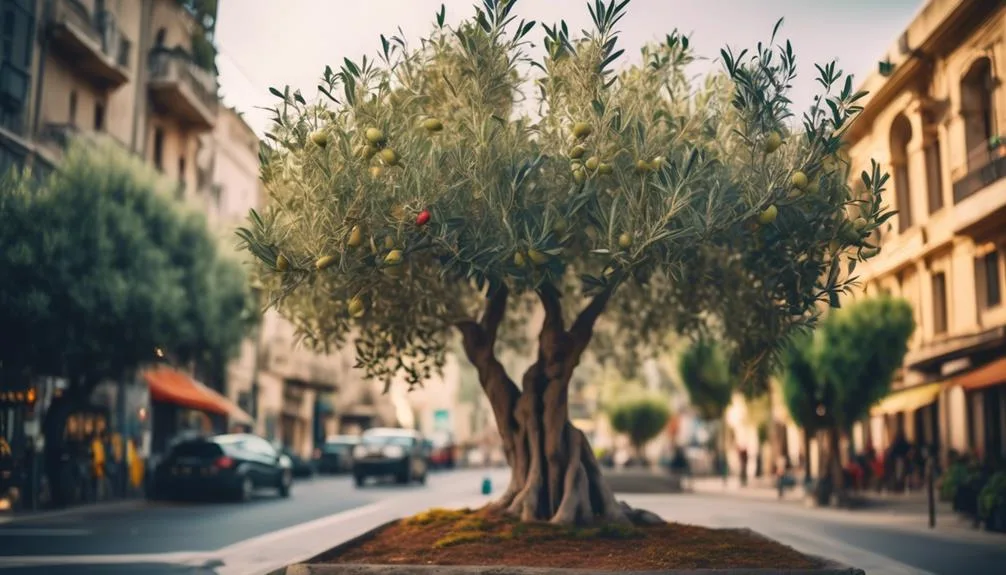Olive trees are known for thriving in the countryside, but can they survive in the bustling city? With the right care, these Mediterranean wonders can not only survive but also flourish amidst urban living.
How do olive trees adapt to the city, and what benefits do they bring to city dwellers? Let's explore urban olive cultivation and see how these resilient trees can thrive in the midst of skyscrapers and busy streets.
Key Takeaways
- Olive trees can face challenges in urban environments due to limited root space, air pollution, restricted sunlight, and harsh conditions.
- Proper soil composition, good water retention, and efficient water management are important considerations for growing olive trees in urban areas.
- Olive trees are adaptable to different climates but thrive particularly well in Mediterranean climates, and they require full sunlight for photosynthesis.
- Regular pruning and maintenance are essential for managing the size and shape of urban olive trees, promoting air circulation and sunlight penetration, and removing dead or diseased branches.
Urban Challenges for Olive Trees
In urban environments, olive trees face challenges such as limited root space, air pollution, and restricted sunlight due to surrounding buildings and infrastructure.
Urban pollution, including vehicle emissions and industrial by-products, can have detrimental effects on the health of olive trees.
The limited space for root expansion in urban settings can constrain the tree's ability to access essential nutrients and water.
Additionally, the shading caused by tall buildings and other structures can lead to reduced sunlight exposure, impacting the tree's photosynthesis process.
These factors combined create a harsh environment for olive trees in urban areas, requiring careful consideration and management to ensure their survival and optimal growth.
Understanding these challenges is crucial for implementing strategies to support the health and vitality of olive trees within city landscapes.
Soil and Water Considerations
Considering the challenges of limited root space and potential nutrient deficiencies, ensuring proper soil composition and irrigation for urban olive trees is crucial for their health and longevity. When it comes to soil composition, urban environments often feature compacted or poor-quality soil, which can impede olive tree root growth and nutrient uptake. To address this, incorporating well-draining soil with good water retention properties is essential. This will help prevent waterlogging and oxygen deprivation, promoting healthy root development. Additionally, a balanced mix of organic matter can improve soil structure and fertility, aiding in nutrient absorption. For irrigation, efficient water management is key. Providing consistent moisture while avoiding waterlogged conditions is vital for olive tree health. Consider installing drip irrigation systems to deliver water directly to the roots while minimizing water waste.
| Soil Composition | Water Retention |
|---|---|
| Well-draining soil | Consistent moisture |
| Organic matter | Efficient irrigation |
Climate and Sunlight Requirements
To ensure the health and longevity of urban olive trees, it's crucial to address their climate and sunlight requirements, building on the foundation of soil composition and irrigation considerations.
Urban landscaping presents unique challenges, but olive trees are adaptable and can thrive in a variety of climates. These trees are well-suited for Mediterranean climates, characterized by hot, dry summers and mild, wet winters. However, they're also remarkably resilient and can adapt to different conditions with proper care.
When selecting a location for planting, consider the sunlight exposure. Olive trees generally require full sunlight for optimal growth and fruit production. Adequate sunlight is essential for photosynthesis and fruit ripening.
With the right climate adaptation and attention to sunlight needs, urban olive trees can become striking additions to the cityscape.
Pruning and Maintenance in Urban Areas
For thriving urban olive trees, regular pruning and maintenance are essential to ensure their health and aesthetic appeal. Urban pruning plays a crucial role in managing the size and shape of olive trees, preventing them from obstructing walkways or buildings. It also promotes better air circulation and sunlight penetration, reducing the risk of disease in urban environments.
By removing dead or diseased branches, you can enhance the overall health and vigor of the tree. Additionally, regular maintenance, such as watering, mulching, and fertilizing, is vital for sustaining the tree's well-being amidst the urban setting. Proper care not only supports the tree's growth and resilience but also contributes to a more welcoming and visually pleasing urban landscape.
Benefits of Growing Olive Trees in Urban Environments
In urban environments, cultivating olive trees offers numerous benefits, enhancing the surroundings with their vibrant foliage and providing a source of locally grown, sustainable produce.
The economic benefits and environmental impact of growing olive trees in urban areas are significant:
- Economic Benefits
- Olive oil production creates job opportunities.
- Locally grown olives support the economy.
- Olive trees enhance property value.
- Environmental Impact
- They improve air quality by absorbing pollutants.
- Olive trees contribute to urban biodiversity.
Conclusion
Incorporating olive trees into urban environments isn't only feasible but also beneficial. By addressing soil, water, climate, and sunlight needs, and with proper maintenance, olive trees can thrive in the city, providing beauty, shade, and delicious olives.
Their presence contributes to a greener urban landscape, offering both aesthetic and practical advantages. Consider the impact of introducing olive trees to your city, and reap the rewards of their resilience and productivity.

